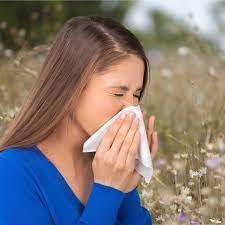How to Cope with Seasonal Allergies

If you are anything like me, allergy season will kill you; I’m not looking forward to it. I’ve had the worst allergy problems since January and it’s not even allergy season. How about this one . . . I live in Florida, and I am allergic to tree and grass! HA! It is great for me during allergy season. I thought this blog may help some of you (and myself) deal with these terrible allergies we all seem to have.
My allergies come with sneezing, congestion, coughing, runny nose, itchy throat and eyes, and whatever other symptoms Mother Nature wants to throw at me. Short of a self-induced coma until after allergy season is over, here are some things we can try.
• It’s recommended to stay indoors on dry, windy days and to go outside after a good rain. That’s pretty much impossible in Florida as most days are dry here and I love to be outside.
• Do not hang your laundry outside. As pollen can cling to your clothes.
• Do not mow your lawn or pull weeds. This can stir up the allergens in the air. Have a lawn service or ask a friend to mow for you during this time.
• If you must work outside, try to wear a mask so you don’t breathe the pollen.
• If you were outside, take off your clothes and shower immediately to rinse off any pollen that may be on your body.
Make sure you know what’s blooming and when. You can check the local news or if you have an Alexa or Google device, just ask what the pollen report is for the day. This is also a good way to narrow down what you are allergic to instead of spending money on testing and being poked with needles.
If pollen counts are expected to be high, take any medication before symptoms start and make sure your windows are closed. Also, stay inside during the early morning hours as that is when the pollen count is at its highest.
Keep the air inside your home clean. Use air conditioning in your house and make sure your filter is clean. Also, use air conditioning in your car, which is hard for me because I drive a convertible. The drier the air in your home the better, so you can get a dehumidifier to help dry it out. Use an air filter in your bedroom and clean your floors with a vacuum cleaner that has a HEPA filter.
There are so many over-the-counter remedies out there and you don’t need a prescription for them, but they all work differently.
Antihistamines help with the sneezing, itching, stuffy or runny nose, and watery eyes. These are your regular allergy pills like Zyrtec, Allegra, and Claritin and many of these have a generic equivalent that works just as good.
Nasal sprays help with your nasal symptoms. These include Flonase and Nasacort and a few others.
Oral decongestants such as Sudafed helps with nasal stuffiness. You may need to use an antihistamine with a decongestant but talk to your doctor first.
Rinse your sinuses with a saline nasal spray. This will flush out any mucus and allergens from your nose. You can purchase these kits and they are pretty inexpensive or you can make your own. If you make your own solution, use 1 qt. water (bottled), 1.5 tsp. canning salt, and 1 tsp. baking soda. Make sure you rinse your device after each use.
If you don’t want to take medications for your allergies, there are many natural remedies out there. Check with a health food store, but know that these are not proven to work. You may want to try acupuncture as well.
If none of the above works, you may need to get shots for your allergies (I hope I don’t have to go this route). Whatever you need to do, do it and take care of yourself. Word is this will be the worst allergy season yet.



